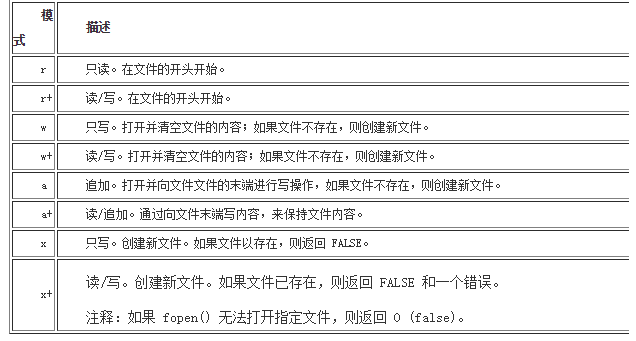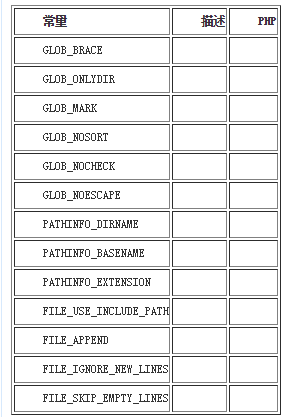PHP Advanced Tutorial (3): PHP File Processing
fopen() function is used to open files in PHP.
Open File
fopen() function is used to open files in PHP.
The first parameter of this function contains the name of the file to be opened, and the second parameter specifies which mode to use to open the file:
$ file=fopen("welcome.txt","r");
?>
Files may be opened in the following modes:

Example
如果 fopen() 不能打开指定的文件,下面的例子会生成一段消息:
<html>
<body>
<?php
$file=fopen("welcome.txt","r") or exit("Unable to open file!");
?>
</body>
</html>
关闭文件
fclose() 函数用于关闭打开的文件。
<?php
$file = fopen("test.txt","r");
//some code to be executed
fclose($file);
?>
检测 End-of-file
feof() 函数检测是否已达到文件的末端 (EOF)。
在循环遍历未知长度的数据时,feof() 函数很有用。
注释:在 w 、a 以及 x 模式,您无法读取打开的文件!
if (feof($file)) echo "End of file";
逐行读取文件
fgets() 函数用于从文件中逐行读取文件。
注释:在调用该函数之后,文件指针会移动到下一行。Example
下面的例子逐行读取文件,直到文件末端为止:
<?php
$file = fopen("welcome.txt", "r") or exit("Unable to open file!");
//Output a line of the file until the end is reached
while(!feof($file))
{
echo fgets($file). "<br />";
}
fclose($file);
?>
逐字符读取文件
fgetc() 函数用于从文件逐字符地读取文件。
注释:在调用该函数之后,文件指针会移动到下一个字符。Example
下面的例子逐字符地读取文件,直到文件末端为止:
<?php
$file=fopen("welcome.txt","r") or exit("Unable to open file!");
while (!feof($file))
{
echo fgetc($file);
}
fclose($file);
?>
PHP Filesystem 参考手册
如需完整的 PHP 文件系统参考手册
PHP Filesystem 简介
Filesystem 函数允许您访问和操作文件系统。
安装
Filesystem 函数是 PHP 核心的组成部分。无需安装即可使用这些函数。
Runtime 配置
文件系统函数的行为受到 php.ini 中设置的影响。
文件系统配置选项:
Unix/Windows Compatibility
When specifying paths on Unix platforms, the forward slash (/) is used as the directory separator. On Windows platforms, both forward slash (/) and backslash () can be used.
PHP Filesystem Function
PHP: Indicates the earliest PHP version that supports this function.
Function
basename() Returns the filename part of the path. 3
Chgrp () Change the file group. 3
chmod () Change the file mode. 3
Chown () Change the file owner. . .
dirname() Returns the directory name part of the path. 3
disk_free_space() Returns the free space of the directory. 4
disk_total_space() Returns the total disk capacity of a directory. 4
diskfreespace() Alias of disk_free_space(). 3
fclose() Close the open file. 3
feof() Tests whether the file pointer reaches the end of the file. 3
fflush() Output buffer content to the open file. 4
fgetc() Returns characters from an open file. 3
fgetcsv() Parses a line from the open file and verifies the CSV field. 3
fgets() Returns a line from the open file. 3
fgetss() Read a line from the open file and filter out HTML and PHP tags. 3
file() Read the file into an array. 3
file_exists() Check whether the file or directory exists. 3
file_get_contents() Read the file into a string. 4
file_put_contents Write strings to files. 5
fileatime() Returns the last access time of the file. 3
filectime() Returns the last change time of the file. 3
filegroup() Returns the group ID of the file. 3
fileinode() Returns the inode number of the file. 3
filemtime() Returns the last modification time of the file. 3
fileowner() The user ID (owner) of the file. 3
fileperms() Returns the permissions of the file. 3
filesize() Returns the file size. 3
filetype() Returns the file type. 3
flock() Lock or release the file. 3
fnmatch() Matches file names or strings according to the specified pattern. 4
fopen() Open a file or URL. 3
fpassthru() Read data from the open file until EOF and write the result to the output buffer. 3
fputcsv() Format rows to CSV and write to an open file. 5
fputs() Alias of fwrite(). 3
fread() Read the open file. 3
fscanf() Parses the input according to the specified format. 4
fseek() Locate in the open file. 3
fstat() Returns information about an open file. 4
ftell() Returns the read/write position of the file pointer 3
ftruncate() Truncates the file to the specified length. 4
fwrite() Write to the file. 3
glob() Returns an array containing file names/directories matching the specified pattern. 4
is_dir() Determines whether the specified file name is a directory. 3
is_executable() Determines whether the file is executable. 3
is_file() Determines whether the specified file is a regular file. 3
is_link() Determines whether the specified file is a link. 3
is_readable() Determines whether the file is readable. 3
is_uploaded_file() Determines whether the file was uploaded via HTTP POST. 3
is_writable() Determines whether the file is writable. 4
is_writeable() Alias of is_writable(). 3
link() Create a hard link. 3
linkinfo() Returns information about a hard link. 3
lstat() Returns information about a file or symbolic link. 3
mkdir() Create a directory. 3
move_uploaded_file() Move the uploaded file to a new location. 4
parse_ini_file() Parse a configuration file. 4
pathinfo() Returns information about the file path. 4
pclose() Close the process opened by popen(). 3
popen() Open a process. 3
readfile() Read a file and output it to the output buffer. 3
readlink() Returns the target of the symbolic link. 3
realpath() Returns the absolute path name. 4
rename() Duplicately named files or directories. 3
rewind() Rewind the position of the file pointer. 3
rmdir() Delete empty directories. 3
set_file_buffer() Set the buffer size of the opened file. 3
stat() Returns information about the file. 3
symlink() Create a symbolic link. 3
tempnam() Create a unique temporary file. 3
tmpfile() Create a temporary file. 3
touch() Set the access and modification time of the file. 3
umask() Change the file permissions of the file. 3
unlink() Delete files. 3
PHP Filesystem Constant
PHP: Indicates the earliest PHP version that supports this constant.

The above is the content of PHP Advanced Tutorial (3): PHP file processing. For more related content, please pay attention to the PHP Chinese website (www.php.cn)!

Hot AI Tools

Undresser.AI Undress
AI-powered app for creating realistic nude photos

AI Clothes Remover
Online AI tool for removing clothes from photos.

Undress AI Tool
Undress images for free

Clothoff.io
AI clothes remover

Video Face Swap
Swap faces in any video effortlessly with our completely free AI face swap tool!

Hot Article

Hot Tools

Notepad++7.3.1
Easy-to-use and free code editor

SublimeText3 Chinese version
Chinese version, very easy to use

Zend Studio 13.0.1
Powerful PHP integrated development environment

Dreamweaver CS6
Visual web development tools

SublimeText3 Mac version
God-level code editing software (SublimeText3)

Hot Topics
 PHP 8.4 Installation and Upgrade guide for Ubuntu and Debian
Dec 24, 2024 pm 04:42 PM
PHP 8.4 Installation and Upgrade guide for Ubuntu and Debian
Dec 24, 2024 pm 04:42 PM
PHP 8.4 brings several new features, security improvements, and performance improvements with healthy amounts of feature deprecations and removals. This guide explains how to install PHP 8.4 or upgrade to PHP 8.4 on Ubuntu, Debian, or their derivati
 7 PHP Functions I Regret I Didn't Know Before
Nov 13, 2024 am 09:42 AM
7 PHP Functions I Regret I Didn't Know Before
Nov 13, 2024 am 09:42 AM
If you are an experienced PHP developer, you might have the feeling that you’ve been there and done that already.You have developed a significant number of applications, debugged millions of lines of code, and tweaked a bunch of scripts to achieve op
 How To Set Up Visual Studio Code (VS Code) for PHP Development
Dec 20, 2024 am 11:31 AM
How To Set Up Visual Studio Code (VS Code) for PHP Development
Dec 20, 2024 am 11:31 AM
Visual Studio Code, also known as VS Code, is a free source code editor — or integrated development environment (IDE) — available for all major operating systems. With a large collection of extensions for many programming languages, VS Code can be c
 Explain JSON Web Tokens (JWT) and their use case in PHP APIs.
Apr 05, 2025 am 12:04 AM
Explain JSON Web Tokens (JWT) and their use case in PHP APIs.
Apr 05, 2025 am 12:04 AM
JWT is an open standard based on JSON, used to securely transmit information between parties, mainly for identity authentication and information exchange. 1. JWT consists of three parts: Header, Payload and Signature. 2. The working principle of JWT includes three steps: generating JWT, verifying JWT and parsing Payload. 3. When using JWT for authentication in PHP, JWT can be generated and verified, and user role and permission information can be included in advanced usage. 4. Common errors include signature verification failure, token expiration, and payload oversized. Debugging skills include using debugging tools and logging. 5. Performance optimization and best practices include using appropriate signature algorithms, setting validity periods reasonably,
 PHP Program to Count Vowels in a String
Feb 07, 2025 pm 12:12 PM
PHP Program to Count Vowels in a String
Feb 07, 2025 pm 12:12 PM
A string is a sequence of characters, including letters, numbers, and symbols. This tutorial will learn how to calculate the number of vowels in a given string in PHP using different methods. The vowels in English are a, e, i, o, u, and they can be uppercase or lowercase. What is a vowel? Vowels are alphabetic characters that represent a specific pronunciation. There are five vowels in English, including uppercase and lowercase: a, e, i, o, u Example 1 Input: String = "Tutorialspoint" Output: 6 explain The vowels in the string "Tutorialspoint" are u, o, i, a, o, i. There are 6 yuan in total
 How do you parse and process HTML/XML in PHP?
Feb 07, 2025 am 11:57 AM
How do you parse and process HTML/XML in PHP?
Feb 07, 2025 am 11:57 AM
This tutorial demonstrates how to efficiently process XML documents using PHP. XML (eXtensible Markup Language) is a versatile text-based markup language designed for both human readability and machine parsing. It's commonly used for data storage an
 Explain late static binding in PHP (static::).
Apr 03, 2025 am 12:04 AM
Explain late static binding in PHP (static::).
Apr 03, 2025 am 12:04 AM
Static binding (static::) implements late static binding (LSB) in PHP, allowing calling classes to be referenced in static contexts rather than defining classes. 1) The parsing process is performed at runtime, 2) Look up the call class in the inheritance relationship, 3) It may bring performance overhead.
 What are PHP magic methods (__construct, __destruct, __call, __get, __set, etc.) and provide use cases?
Apr 03, 2025 am 12:03 AM
What are PHP magic methods (__construct, __destruct, __call, __get, __set, etc.) and provide use cases?
Apr 03, 2025 am 12:03 AM
What are the magic methods of PHP? PHP's magic methods include: 1.\_\_construct, used to initialize objects; 2.\_\_destruct, used to clean up resources; 3.\_\_call, handle non-existent method calls; 4.\_\_get, implement dynamic attribute access; 5.\_\_set, implement dynamic attribute settings. These methods are automatically called in certain situations, improving code flexibility and efficiency.






